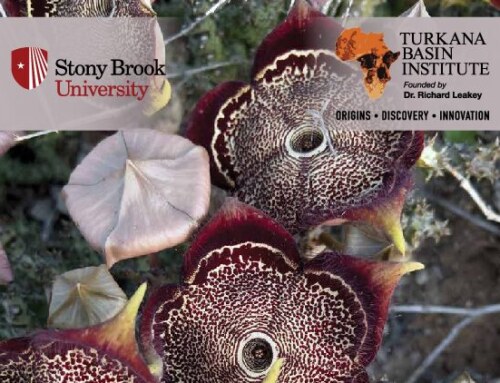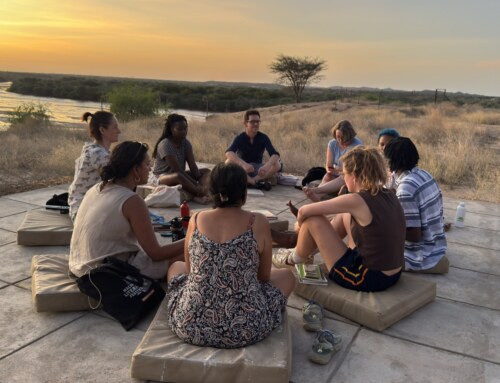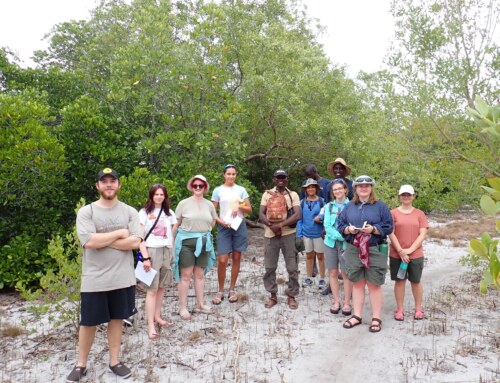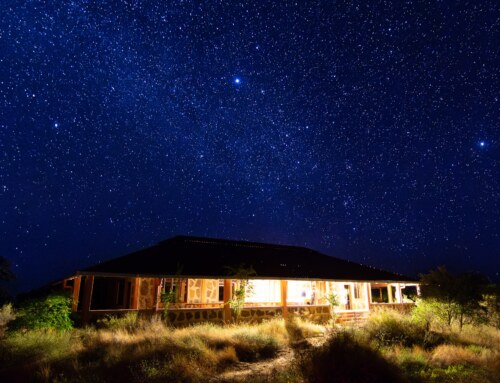After a rest day on Sunday, June 9th, Monday began with a Swahili lesson followed by the introduction of a new module on infectious diseases. Dr. Jon Epstein, an infectious disease specialist who works at EcoHealth Alliance in New York City and who spent a few days with us at Mpala, gave a lecture on the many ways that diseases can pass between humans and animals. His discussion of spillover events at the human-animal interface illustrated that the ways we interact with the environment has a huge impact on our exposure to infectious diseases.


In the afternoon, we headed out to a local village called Lekiji. We were greeted with a performance, given a tour of the gardens, and taken to the convergence point of two rivers. Before heading out, we had the opportunity to purchase some of their crafts. We then got back into the cars and drove to a different part of the town to observe how the local people coexist with their livestock, which include cows, goats, chickens, and camels. Dr. Edward Kariuki gave a quick lecture about zoonoses from cows and how they can be transported by ticks.
On Tuesday, June 11th, Dr. Epstein gave a lecture on Nipah virus: a bat-borne, zoonotic disease. Later in the morning, we departed for another local village called Il Motiok, the inhabitants of which are mostly pastoralists who raise camels, sheep, goats, and donkeys. They invited us into their lodge and graciously served us lunch, and we were able to hear a few words from community leaders. We then visited a different part of the village where we saw traditional homes and had the opportunity to purchase more crafts, including local beadwork. We got back to camp shortly before dinner, and later that night some students went out on a game drive.


The next day began with a Swahili lesson and a lecture by Dr. Epstein, who described his approach to disease prevention. His organization, EcoHealth Alliance, uses a holistic approach called One Health, which works to unify environmental, human, and animal health with the goal of facilitating collaboration to prevent disease spillover. After the lecture, Dr. Epstein and Dr. Kariuki left for Nairobi while the students broke into four groups to write a joint report about a tropical infectious disease of their choice. Their task was to describe the symptoms, distribution, modes of transmission, and likely reservoirs of the disease (which must be found in Africa). Students had the afternoon to complete this assignment, and after they submitted it, Dr. Green led an optional workshop on data analysis in Python. After dinner, students were advised to rest up, because the next morning we would be leaving early to hike Mount Kenya.
We arrived at the mountain in the late morning on June 13th, and we were accompanied by Mt Kenya rangers who knew the area extremely well. The topic for the day was alpine ecology, which Dr. Green introduced with a talk about Mount Kenya and its geological history. It took about an hour to hike to the Global Atmosphere Watch Mount Kenya Station, where we had lunch and some students posed for photos with the Kenyan flag. Before descending back down the mountain, we took a quick detour to look at some of the local vegetation, which is uniquely adapted to withstand the mountain’s cold temperatures.


Before leaving the immediate Mount Kenya area, we stopped just south of the equator to see some of the area’s oldest trees. After we returned to camp, students had the option of attending a 5:30pm lecture by Dr. Dan Rubenstein, who studies zebras at Mpala. His talk was widely attended by people both within and outside of our program, and in addition to learning a great deal about the social systems of zebra species in the Mpala area, Dr. Rubenstein explained how he is using his research to empower local people to conduct citizen science. After the lecture there was time for questions, and then we went to the mess hall for dinner.
On Friday, June 14th, the day began at 8:00am with a Swahili class. For the rest of the morning, the students collected data for their ecology projects. The three student groups each went out with a driver and a ranger. A short video was made about the activities of one of the groups, and it can be found here. The findings of their projects were presented on the last day of class, and will be described in the next blog post. Students returned from data collection in time for lunch at 1:00pm, and then they had the afternoon to relax and work more on their projects. Some students organized a soccer match against another student group staying at Mpala, and most of the groups spent time in the lab analyzing their findings from field collection. Dinner was served at 7:30pm.

The next day started with Swahili and a lecture by Dr. Green about global warming. Students took a tea break before returning to the classroom for a discussion about the readings for that day, and then there was an hour-long break for lunch. At 3:00pm, students got into groups which had been created by Dr. Green, and they worked on their data labs, which were due later that night.





